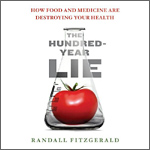 The evidence of harm emerges
The evidence of harm emergesMike: In your research, do you believe that you have found many of those answers? What kinds of links were you able to substantiate and present in the book?
Fitzgerald: I feel like there were some patterns that stared me in the face once I began looking at the evidence from medical science. There are so many studies out there from not just the United States, but from countries worldwide, that indicate a pattern in which synthetic chemicals have increasingly played a role in the types of illnesses and diseases that we are beginning to see at very alarming levels. If you chart on a graph the production of synthetic chemicals, especially since World War II, and you compare that graph to the increase in certain diseases -- for instance, neurological disorders and cancer -- the graphs are almost one on top of the other in sequence, and synchronized.
That led me to believe, even more than just my intuition, that there was something here that needed to be examined in more depth. Once I compared statistics on the production of synthetics to statistics on the increase in diseases, I began looking for the evidence, the so-called "smoking guns" in the studies done by medical science. I found that those studies indeed exist. They are out there, and they just had never been brought together at one place, at one time, before.
Mike: Your book, I think, does an excellent job of translating all of that science into everyday language that people can pick up, without needing a technical background, by the way.
Fitzgerald: I appreciate that.
Learn more: